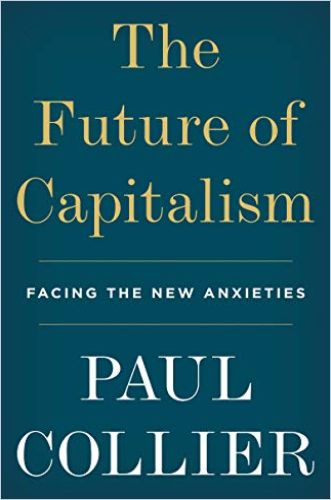Professor Paul Collier, author of the award-winning The Bottom Billion, offers pragmatic – and at times radical – solutions to current economic problems.

A Passionate Call to Reshape Society
Professor Paul Collier
Professor of economics and director of the Center for the Study of African Economies at Oxford University, Paul Collier – a former director of development research at the World Bank – also wrote the award-winning The Bottom Billion and Wars, Guns, and Votes: Democracy in Dangerous Places. Collier has spent his career researching and understanding the effects of developed nations’ wealth on the lives of the world’s poor. While these books are ideal starting places for further reading, Collier’s other worthy and timely titles include Exodus:How Migration Is Changing Our World and The Plundered Planet.
Esteem and Belonging
Collier opens by suggesting that harnessing the universal desire for social esteem and belonging can elicit fairer outcomes from current economic systems. He argues that regarding economics as a function of “self-interest” leads to inefficiencies for society and neglects a motivation that inspires people to improve their communities.
We need to build a critical mass of ethical citizens. Ethical citizens are people who understand the purpose of companies and the vital contribution they can make to society. Paul Collier
Collier resists economist Milton Friedman’s assertion that a firm’s sole obligation is to make a profit. If companies focus on being the best at what they do and on building good relationships, the author contends, they earn more money.
Reciprocity
A pillar of Collier’s position is that what motivates people to give money or care is others giving back to them. He suggests that the smallest reciprocal unit is the family, which establishes bonds and repays mutual obligations over time. Collier may have known happier families than many of his readers have, but his is not an inaccurate model.
Collier deplores that society makes people more individualistic, and he believes that paternalistic government seeks only to identify victims. Society emphasizes personal rights and entitlement, and Collier feels that that reduces the obligation and reciprocity that tie communities together.
People Divided
Collier notes, as have many contemporary commentators, that the educated rich share values different from those of their less educated and less well-off fellow citizens. The affluent build identities through achievement; those with less tend to identify by nationality and locality. International elites feel more affinity with each other than with their conationals. This, too, the author recognizes, fractures societies.
But, Collier concludes, the most effective societal unit remains the nation-state, whose bonds of reciprocity rely on its citizens sharing roughly similar values and priorities. As elites reject national and regional identities, populist and extremist elements exploit the masses. This is Collier’s most profound concern and the driving concept behind this book.
Unless this divergence between our polities and our bonds is reversed, our societies will degenerate, becoming less generous, less trusting and less cooperative.
Paul Collier
Collier raises the issue of economic migrants, who, he feels, primarily benefit themselves – not their host nations – by migrating. He advocates making migrants’ home countries more desirable and financing refugee support in neighboring nations.
Stagnating Cities
Cities in the United States and in rich countries in Europe, Collier explains, have a history of specializing in economic activities. He cites, as examples, north Britain’s Sheffield, which once produced much of the world’s steel, and Stoke-On-Trent, which for centuries boasted world-famous pottery. Global competition destroyed these specializations.
Children in these places face worse economic prospects than their parents did. Collier dislikes how middle-class youngsters are nursed through educational systems and are able to follow opportunities, while poor children stagnate in their decaying cities.
Relocation
Collier chronicles how, when companies in the same commercial activity locate in one area, the pool of skilled labor and the suppliers, customer links and scale advantages make resident businesses and their community prosperous and successful. He cites this regional specialization as generating competitive advantage. Collier asserts that companies seeking to relocate recognize their capacity to raise a city’s fortunes; these firms capture any future benefits they might provide by demanding present-day tax breaks.
Economic Rents
Collier explores a novel theory of taxation. To start, he succinctly charts a city’s progress: Workers earn and their productivity increases, causing others to want to move to the city. Local companies profit, encouraging new start-ups. The value of land, houses and commercial property rises. Landlords, who find themselves in the right place at the right time, have expended little skill, risk or effort in that transformation. Economic rents, Collier details, mean property owners gain while shielded from normal competition.
Land and property taxes, Collier claims, are simple to administer and hard for the rich and their lawyers to evade. If the government taxes landowners’ undeserved bounty, proprietors can still charge maximum fees, so this tax won’t distort property prices and the rental market.
Because high earners benefit from economic rents, Collier suggests taxing this cohort in cities and applying the proceeds to failing peripheral regions. Collier lists utilities, networks and internet platforms as targets for special regulation or taxation.
Reciprocal Ethical Groups
Nations, Collier feels, should embrace trade when it is beneficial and limit the damaging effects of globalization by compensating the have-nots.
The fundamental insight of leaders in 1945 was that the opportunistic behavior of individual nations had to be replaced by common obligations enforced by peer pressure.Paul Collier
Collier believes politicians and economists can harness reciprocity, ethics and cooperation to aid the poor worldwide. He urges adoption of this nonideological pragmatism; escaping the restraints of ideology is a crucial theme for Collier.
A Passionate Philosopher
To wildly understate it, Collier is a rigorous intellectual of vast experience, knowledge and compassion. He aims at an audience somewhere between the public and the academic and policy crowd. But this is no theoretical slog. Collier is a passionate philosopher, offering real-world solutions to problems many people regard as intractable. His ideas feature much common sense and can be revelatory. His prose might bog down from time to time, but anyone who is part of an informed electorate will benefit from his thinking.








